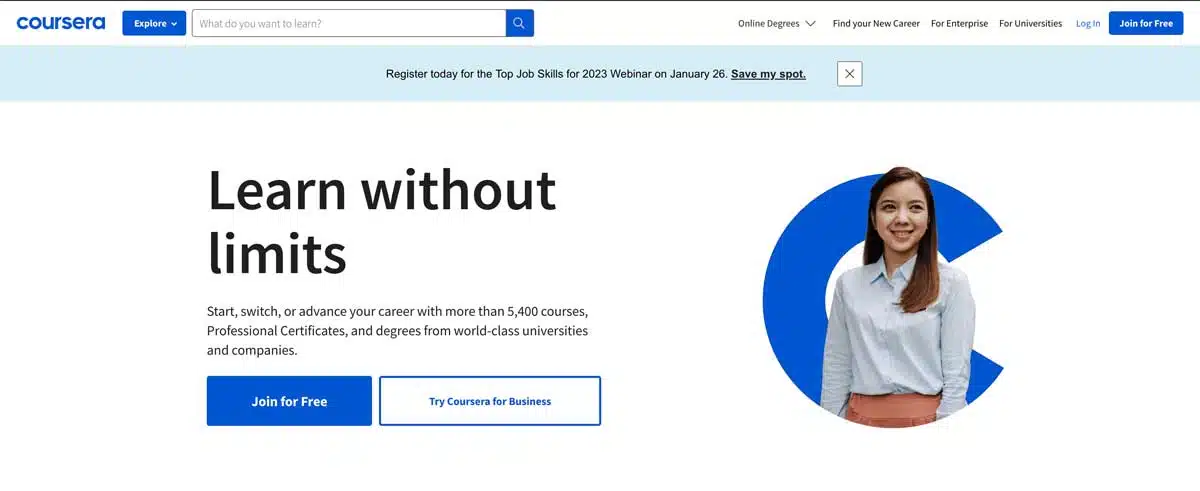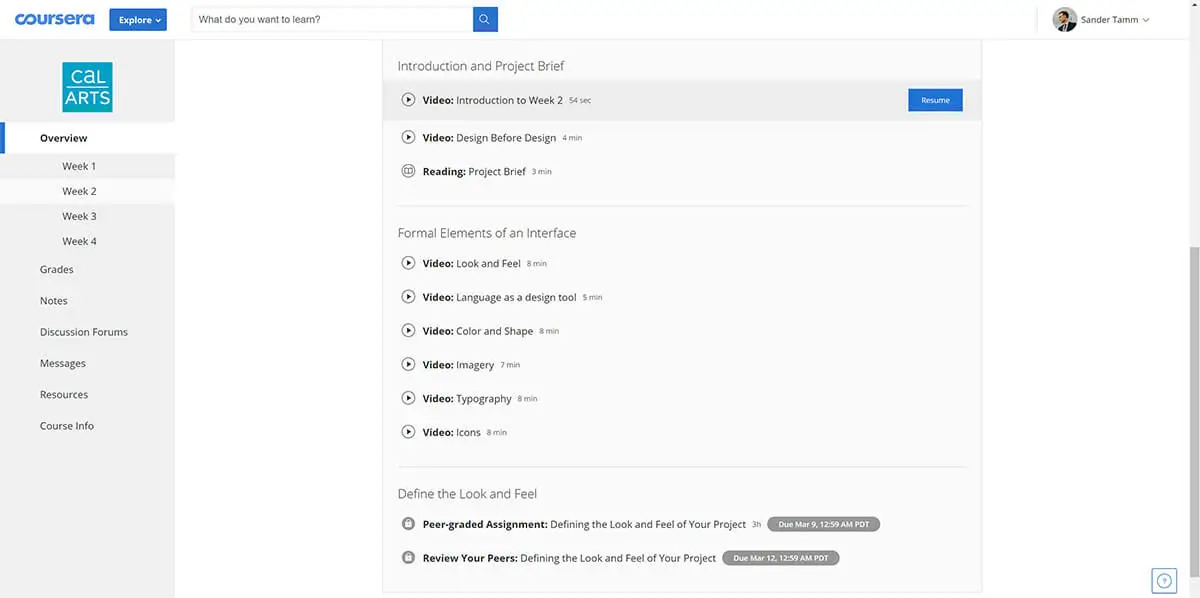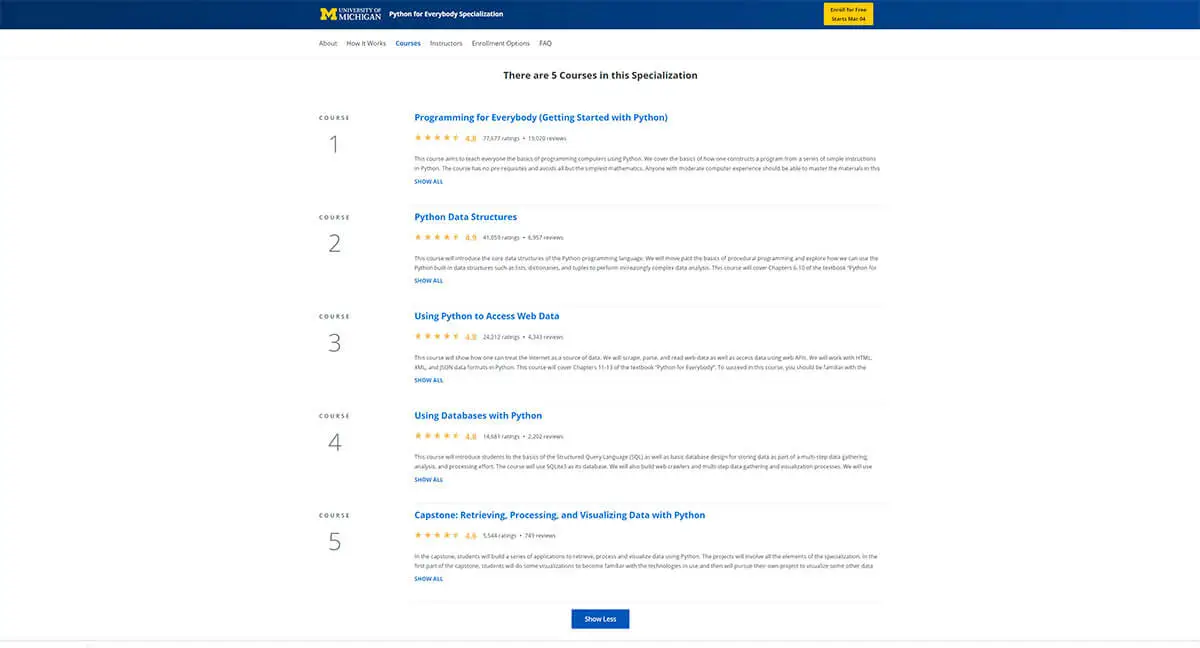About Coursera
Coursera is an online learning platform that offers a wide range of courses and programs from top universities and institutions around the world. It was founded in 2012 by Andrew Ng and Daphne Koller, both computer science professors at Stanford University.
Coursera offers courses in various fields, including computer science, data science, business, health, social sciences, and more. Courses are typically structured as a series of video lectures, quizzes, and assignments, and are often taught by renowned professors and industry experts.
In addition to individual courses, Coursera also offers specialized programs, such as certificates and degrees, which often involve completing a series of courses and projects. Some of these programs are offered in partnership with universities, allowing students to earn a degree or credit towards a degree.
Coursera has over 90 million registered learners and partners with more than 200 leading universities and companies to offer its courses and programs. It also offers financial aid and scholarships to help make education more accessible to all learners.
Coursera Pros and cons
Pros of Coursera:
- Access to high-quality education: Coursera offers access to courses and programs from some of the world’s top universities and institutions, making it possible for learners to access high-quality education from anywhere in the world.
- Flexibility: Coursera courses are typically self-paced, allowing learners to study and complete coursework at their own pace, and on their own schedule. This is especially beneficial for people with busy schedules or those who cannot attend traditional, in-person classes.
- Diverse course offerings: Coursera offers a wide range of courses and programs, allowing learners to explore a variety of subjects and topics. This is particularly helpful for people who are looking to expand their knowledge or switch careers.
- Affordability: Many of Coursera’s courses are free, and learners can also apply for financial aid to cover the cost of courses and programs that require payment.
Cons of Coursera:
- Limited interaction with instructors and peers: Coursera courses are primarily self-paced, which means that there is limited interaction with instructors and peers. This can be a disadvantage for learners who thrive on collaboration and interaction.
- Requires self-discipline: Because Coursera courses are self-paced, learners need to be self-disciplined and motivated to complete the coursework and stay on track.
- No accreditation: While some courses and programs on Coursera are accredited, many are not. This means that completing a course or program on Coursera may not necessarily result in a degree or certification that is recognized by employers.
- Technology limitations: To take Coursera courses, learners need access to a computer and internet connection. This may be a barrier for people who do not have access to these resources.
What is Coursera?
Coursera is an online learning platform that offers courses and programs in various subjects, including business, computer science, data science, social sciences, and more. Founded in 2012 by Stanford professors Andrew Ng and Daphne Koller, Coursera partners with top universities and institutions around the world to provide high-quality education to learners everywhere.
Coursera courses are typically structured as a series of video lectures, quizzes, and assignments, and learners can complete them at their own pace. In addition to individual courses, Coursera also offers specialized programs, such as certificates and degrees, which often require completing a series of courses and projects.
Coursera has over 90 million registered learners and partners with more than 200 leading universities and companies to offer its courses and programs. The platform also offers financial aid and scholarships to help make education more accessible to learners from diverse backgrounds.
History of Coursera
Coursera was founded in 2012 by Andrew Ng and Daphne Koller, both computer science professors at Stanford University. The two founders believed that online education could be used to provide access to high-quality education to people all around the world.
In April 2012, Coursera launched its first courses, with initial offerings from Stanford, Princeton, the University of Michigan, and the University of Pennsylvania. These courses were offered for free and were open to anyone with an internet connection.
Within a year, Coursera had expanded to offer hundreds of courses from universities and institutions around the world. In 2013, the company introduced a new model for earning certificates for completing courses, which allowed learners to pay a fee to receive a verified certificate for completing coursework.
Over the years, Coursera has continued to expand its offerings, partnering with more universities and institutions and launching new programs, such as specializations, degrees, and professional certificates.
Today, Coursera has over 90 million registered learners and partners with more than 200 leading universities and companies around the world. The platform continues to innovate and expand, offering learners access to high-quality education from the comfort of their homes.
How much does Coursera cost?
Coursera offers a wide range of courses and programs, with varying costs depending on the type of course or program. Some courses on Coursera are available for free, while others require payment. Here is an overview of the different pricing models on Coursera:
- Free courses: Coursera offers a selection of courses that are completely free to access. These courses do not offer a certificate upon completion, but they provide learners with access to course materials, lectures, and assignments.
- Audit courses: Many courses on Coursera allow learners to audit the course for free, which means that they can access course materials and lectures but will not receive a certificate upon completion. However, learners can choose to upgrade to a paid version of the course at any time to receive a certificate.
- Paid courses: Some courses on Coursera require payment upfront to access the course materials and lectures. The cost of these courses varies depending on the subject, length, and level of the course.
- Specializations, degrees, and professional certificates: Coursera offers specialized programs that consist of multiple courses and projects. These programs often require payment and can cost anywhere from a few hundred dollars to several thousand dollars.
Coursera also offers financial aid and scholarships to learners who cannot afford to pay for courses and programs. Additionally, some universities and institutions offer their courses on Coursera for free, allowing learners to access high-quality education without paying a fee.
Is Coursera worth It?
Whether or not Coursera is worth it depends on the individual learner’s goals, needs, and circumstances. Here are some factors to consider when deciding if Coursera is worth it for you:
- Educational goals: If you are looking to gain new skills or knowledge in a particular subject, Coursera can be a great resource. The platform offers courses and programs in a wide range of subjects, from computer science to business to the social sciences, which can help you achieve your educational goals.
- Flexibility: Coursera offers courses that are self-paced, allowing learners to study and complete coursework at their own pace and on their own schedule. This flexibility can be beneficial for learners who have busy schedules or cannot attend traditional, in-person classes.
- Cost: Some courses on Coursera are free, while others require payment. It’s important to consider the cost of courses and programs, as well as your budget, when deciding if Coursera is worth it for you. However, many learners find that the cost of Coursera courses is more affordable than traditional in-person education.
- Accreditation: While some courses and programs on Coursera are accredited, many are not. If you are looking for a degree or certification that is recognized by employers or other institutions, it’s important to check if the course or program you are interested in is accredited.
- Learning style: Coursera courses are primarily self-paced and do not offer the same level of interaction with instructors and peers as traditional, in-person education. If you thrive on collaboration and interaction, Coursera may not be the best fit for your learning style.
How does Coursera make money?
Coursera generates revenue primarily through three sources:
- Course fees: Many of the courses and programs on Coursera require payment upfront to access the course materials and lectures. The cost of these courses varies depending on the subject, length, and level of the course. Coursera earns a percentage of the course fee, with the remaining revenue going to the university or institution that created the course.
- Certificates and specializations: Coursera charges learners for certificates and specializations that certify their completion of a course or a series of courses. These certificates can help learners demonstrate their knowledge and skills to employers or other institutions.
- Partnerships: Coursera partners with universities and institutions around the world to offer courses and programs on its platform. Coursera earns a percentage of the revenue generated by these partnerships, with the remaining revenue going to the partner institution.
Coursera also offers enterprise solutions for businesses, which allow companies to access Coursera courses and programs for their employees. This generates revenue for Coursera and provides a new revenue stream for its partner institutions.
How do Coursera’s courses work?
Coursera’s courses are designed to provide high-quality education to learners around the world. Here is an overview of how Coursera’s courses work:
- Course structure: Coursera courses are typically structured into modules or weeks, with each module consisting of a set of videos, readings, and assignments. The course materials are presented in a specific order, with each module building on the previous one.
- Course content: Course content on Coursera can include pre-recorded video lectures, readings, quizzes, and assignments. In some cases, courses may also include interactive elements, such as discussion forums or live webinars.
- Course pacing: Most Coursera courses are self-paced, which means that learners can study and complete coursework on their own schedule. However, some courses may have specific deadlines for assignments or may be offered as part of a cohort, with learners completing the course together over a set period of time.
- Course assessments: Many Coursera courses include assessments to help learners evaluate their understanding of the course materials. Assessments can include quizzes, exams, or assignments.
- Certificates: Learners who complete a Coursera course can earn a certificate of completion. Certificates are available for a fee and provide learners with a way to demonstrate their knowledge and skills to employers or other institutions.
- Collaboration: Coursera courses may offer opportunities for learners to collaborate with one another, such as through discussion forums or group projects.
Are Coursera courses accredited?
Some of the courses and programs on Coursera are accredited, while others are not. It depends on the institution that created the course or program.
Coursera partners with universities and institutions around the world to offer courses and programs on its platform. These institutions may choose to seek accreditation for their courses or programs, but this is not always the case. It’s important to note that even if a course or program is not accredited, it can still provide valuable knowledge and skills that can be useful in various fields.
If accreditation is important to you, you can check if a course or program on Coursera is accredited by looking for accreditation information on the course page or by contacting the institution that created the course directly. It’s important to do your own research and make sure that any accreditation is recognized by the institution or employer you are interested in.
Coursera’s specializations
Coursera Specializations are a series of related courses that are designed to provide learners with in-depth knowledge and skills in a specific area. Here are some examples of specializations available on Coursera:
- Data Science: This specialization includes courses on data analysis, machine learning, and data visualization, among other topics.
- Digital Marketing: This specialization includes courses on social media marketing, search engine optimization (SEO), and marketing analytics, among other topics.
- Business Foundations: This specialization includes courses on accounting, finance, marketing, and operations management, among other topics.
- Deep Learning: This specialization includes courses on neural networks, convolutional networks, and recurrent networks, among other topics.
- Full Stack Web Development: This specialization includes courses on HTML, CSS, JavaScript, and server-side development, among other topics.
- Graphic Design: This specialization includes courses on typography, color theory, and layout, among other topics.
- Python for Everybody: This specialization includes courses on Python programming, web scraping, and database management, among other topics.
These are just a few examples of the many specializations available on Coursera. Specializations can help learners gain expertise in a particular field or prepare for a career in a specific industry.
Coursera’s MasterTrack programs
Coursera’s MasterTrack programs are a series of courses that are designed to provide learners with a pathway to earning a master’s degree or a professional certificate. Here are some key features of MasterTrack programs:
- Partnership with universities: MasterTrack programs are created in partnership with top universities around the world, which means that learners have access to high-quality education from renowned institutions.
- Rigorous curriculum: MasterTrack programs include a rigorous curriculum that is designed to prepare learners for careers in a variety of fields. The courses are taught by experienced instructors and cover a wide range of topics.
- Flexible learning: MasterTrack programs are designed to be flexible, allowing learners to study at their own pace and on their own schedule. However, learners are expected to meet specific deadlines for assignments and assessments.
- Credential options: Upon completion of a MasterTrack program, learners can choose to receive a certificate of completion or apply to the partner university to earn academic credit toward a master’s degree or a professional certificate.
- Industry relevance: MasterTrack programs are designed to be relevant to the needs of industry, which means that learners can gain skills and knowledge that are in high demand by employers.
Examples of MasterTrack programs include the University of Michigan’s Applied Data Science with Python program, the University of Illinois at Urbana-Champaign’s Digital Marketing MasterTrack Certificate, and the University of Pennsylvania’s Robotics MasterTrack Certificate.
Coursera’s online degrees
Coursera offers online degree programs in partnership with top universities around the world. These online degrees are designed to provide learners with the opportunity to earn a high-quality degree from a top university, while studying online and on their own schedule. Here are some key features of Coursera’s online degree programs:
- University partnerships: Coursera partners with top universities around the world to offer online degree programs. This means that learners have access to high-quality education from renowned institutions.
- Accreditation: Online degree programs on Coursera are accredited, which means that the degrees are recognized by employers and academic institutions around the world.
- Rigorous curriculum: Online degree programs on Coursera include a rigorous curriculum that is designed to prepare learners for careers in a variety of fields. The courses are taught by experienced instructors and cover a wide range of topics.
- Flexible learning: Online degree programs on Coursera are designed to be flexible, allowing learners to study at their own pace and on their own schedule. However, learners are expected to meet specific deadlines for assignments and assessments.
- Affordable: Online degree programs on Coursera are often more affordable than traditional degree programs, which means that learners can save money while earning a high-quality degree.
Examples of online degree programs on Coursera include the University of Illinois at Urbana-Champaign’s Master of Computer Science, the University of Pennsylvania’s Master of Applied Positive Psychology, and HEC Paris’ Online Master’s in Innovation and Entrepreneurship.
Conclusion
In conclusion, Coursera is an online learning platform that offers a wide range of courses, specializations, MasterTrack programs, and online degree programs in partnership with top universities around the world. Learners can study at their own pace and on their own schedule, and many courses are available for free. Coursera’s courses are designed to provide learners with the knowledge and skills they need to succeed in their careers, and the platform is accessible to learners from all over the world. Overall, Coursera is a great resource for anyone looking to enhance their education or advance their career.






0 Comments